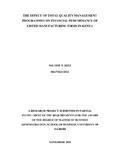| dc.description.abstract | This study sought to determine the effect of TQM programmes on financial
performance of listed manufacturing firms in Kenya. To achieve this goal, the study
used a descriptive research design. The study used a census of all listed manufacturing
firms. The study used both Primary and secondary data sources. Primary data was
collected through a structured questionnaire while secondary data was extracted from
financial statement of the listed manufacturing firms. Data analysis was done using
descriptive statistics, Pearson’s correlation coefficient and regression analysis. The
study found that the most popular TQM programmes used by the listed manufacturing
firms are: ISO 9000 and continuous improvements. The findings observed that all the
manufacturing firms complied with ISO 9000, this implies that most manufacturing
firms were ISO certified. The findings also revealed that most manufacturing firms
adopted integrated management systems to enhance information sharing; this
contributed to cost reduction and thus improved financial performance of the listed
manufacturing firms. The correlation results conclude that there was moderate
correlation between TQM programs and financial performance of the listed
manufacturing firms in Kenya. The findings also revealed that benchmarking
practices and continuous improvement were statistically significant in the model. This
is because their p-values were less than 5%. On the other hand, six sigma, IMS and
firm size were found to be statistically insignificant because their probability values
were above 5%. The limitation for this study is that it was limited to listed
manufacturing firms in Kenya; the findings cannot be applicable directly or indirectly
to other organizations operating outside the context of manufacturing sector. It would
be appropriate for any reader to understand that these findings can only be used for
comparative purposes only and not direct application of any other sector. The study
therefore recommends that the Kenya Association of Manufacturers should ensure
that manufacturing firms comply with the safety and regulatory framework on matters
of quality management. This can be achieved by conducting regular audits to ensure
that firms that provide goods and services comply with quality standards, policies and
procedures in order to effectively provide quality services to the customers. | en_US |

